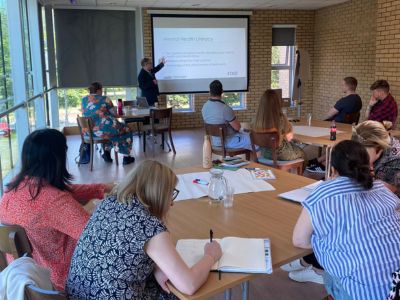
A new report from the Sutton Trust examines the socio-economic inequalities within the SEND system in England
The new report, released today (16th October 2025) examines the socio-economic inequalities within the Special Educational Needs and Disabilities (SEND) system in England. Highlighting that while the number of children with SEND is growing, children eligible for Free School Meals (FSM) are significantly over-represented within this cohort, experiencing poorer educational outcomes, such as lower Key Stage 4 attainment and higher persistent absence rates.
The report details how more affluent families are better positioned to navigate the complex SEND system, often spending money on Education, Health and Care Plan (EHCP) applications and tribunals, leading to higher success rates in securing EHCPs and special school places. This disparity creates a “double disadvantage” for children from lower-income families who have SEND, prompting the authors to recommend policy reforms that acknowledge and mitigate these socio-economic barriers. Finally, the research notes that parents generally support inclusive mainstream schooling, but those with children in special schools report higher satisfaction.
Access the report titled “Double Disadvantage?” by Charlotte O’Regan and Kevin Latham for the Sutton Trust –
Sutton Trust Report: A Tipping Point for SEND in UK Schools
The recent report from the Sutton Trust on Special Educational Needs and Disabilities (SEND) in the UK has delivered a crucial and challenging verdict on the state of provision. For school leaders and practitioners, the findings are not just statistical—they are a stark call to action. They confirm and deepen many of the capacity, equity, and practice issues we have previously explored, demanding an immediate review of how UK schools operate, fund, and deliver inclusive education.
The Scale of the Challenge: Capacity and Complexity
The Sutton Trust confirms that the SEND system is under immense pressure, a trend we highlighted in our previous feature, Statistics Special Educational Needs in England.
The new data shows the growing volume and complexity in stark detail:
- Growing Cohort Size: Over 1.7 million pupils in England now have identified SEND, a 5.6% increase since 2024.
- EHCP Surge: The share of pupils with an Education, Health and Care Plan (EHCP) has nearly doubled, rising from 2.7% to 5.2% (or 5.3%) between 2016 and 2025.
- Complex Needs in Mainstream: With special school places increasingly reserved for the highest level of need, mainstream schools are shouldering the burden of supporting children with more severe or complex SEND than in previous years.
Implication for Schools: This capacity crisis means that policy must pivot towards increasing capacity within mainstream settings, for instance, through the implementation of SEND Hubs or improved partnership working. The report reinforces the urgent need to address the financial sustainability of the system, with 42% of parents feeling too little government money is spent on SEND.
Equity & Access: Confronting the ‘Double Disadvantage’
Perhaps the most alarming finding is the evidence of systemic inequality, where a pupil’s socio-economic background heavily influences their access to support and, ultimately, their outcomes. The report illustrates a “double disadvantage” for children eligible for Free School Meals (FSM) who also have SEND.
- Unequal Access: Affluent families are significantly better equipped to secure EHCPs and special school places. For example, 11% of middle-class parents spent over £5,000 on applications, compared to just 1% of working-class parents. This navigability barrier acts as a rationing system that benefits those who can afford to fight.
- Disproportionate Outcomes: The FSM/SEND group faces significantly lower attainment. Only 7.5% of FSM children with an EHCP secured a grade 4+ in English and Maths, compared to 17.3% of non-FSM children with an EHCP.
- Attendance and Behaviour: Attendance is lower for FSM/SEND pupils (86.3% for EHCPs) and suspension rates are far higher (27.55 per 100 FSM pupils vs. 7.55 for non-SEND pupils).
Implication for Schools: Leaders must work to increase the consistency of SEND identification and support to minimise these socio-economic disparities. Crucially, as we discussed in More Support for Neurodivergent Children, there is a strong case for schools to simplify internal processes and create systems to actively support parents—especially those from disadvantaged backgrounds—in navigating the complex SEND system and its paperwork. Support must be provided based on need, not label, particularly while children wait for diagnoses, as lower-income backgrounds often face longer waiting times.
Improving Practice: The Inclusion Challenge
While most parents support inclusion in principle, feeling that mainstream placement benefits all children, the report exposes a major disconnect: parental satisfaction is dramatically higher in special schools (91% satisfied) compared to mainstream schools (68% satisfied). This satisfaction gap is the ultimate indicator of the challenge facing mainstream inclusion.
The path to closing this gap lies in refining school-level practice, drawing on evidence-based strategies, as detailed in our analysis of the EEF Guidance Report SEND.
The Sutton Trust report offers direct, reflective actions for school leaders:
- Data Analysis: Examine how the socio-economic make-up of the SEND cohort compares to the whole school and identify how FSM pupils vary by category of SEND.
- Collaboration: Ensure the Pupil Premium Lead collaborates directly with the SENDCo to develop targeted support for children facing the double disadvantage.
- Accessibility: Evaluate whether the school’s approach for parents seeking support is truly simple and easy to navigate, not an inadvertent barrier.
- Targeted Barriers: Proactively identify and address any specific barriers to learning, attendance, or public examination performance faced by FSM/SEND children.
Finally, effective inclusion requires schools to be supported to create calm, consistent learning environments conducive to the success of all pupils. The report clearly shows that the ambition for an inclusive system is sound, but its execution in mainstream settings urgently needs to improve to match the efficacy and parental confidence seen in special schools.
Lily Blakeledge
The Team at AMHIE
October 2025
Learn and develop your whole school mental health strategy with AMHIE

AMHIE’s DfE-aligned training equips your whole-school team to achieve mental health excellence and secure outstanding inspection outcomes. The clear ROI lies in transforming your core school culture and practices from reactive support to proactive prevention. This strategic shift allows your staff to confidently move away from traditional sanctions and toward implementing alternative, positive behaviour management strategies, creating a supportive learning environment. This is your evidence-based pathway to compliance and long-term well-being success. Join over 1,500 trained leaders who trust AMHIE.
Ready to embed a positive whole-school approach? Explore the full AMHIE training offer and secure your team’s place today: Visit the AMHIE Training Page
